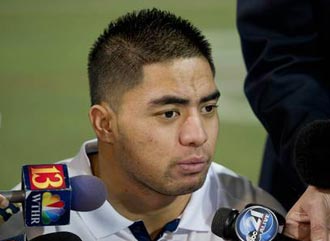Manti Te’o‘s online romance with the imaginatively-named but fatally diseased Lennay Marie Kekua has prematurely shoved poor Lance Armstrong from his rightful place on the homepages of sports sites around the world.
The ex-7-time Tour de France-winner had confessed to Oprah that he had been lying through his teeth all these years only to be denied the spotlight mere hours later by a Heisman runner-up who just led his team to the wrong side of a 42-12 rout in the national championship game by missing a personal-worst 14 tackles.
Armstrong can take solace in the fact that Te’o is taking a page from his book and denying that he had been an active participant in a hoax that saw his imaginary girlfriend killed off by leukemia within hours of his real grandmother and just three days before he led the Fighting Irish to a stunning upset of Michigan State.
Te’o‘s denials are inherently un-credible, of course. Not only did he personally gild the lily by talking about his imaginary initial meeting with the non-existent Kekua after a 2009 football game at Stanford, he also happens to be close to Ronaiah Tuiasosopo, the young Lancaster man who fabricated Kekua using photos obtained from an innocent high school friend.
The many posted pictures of Te’o with Tuiasosopo suggest they are too close for the hoax to have been one-sided. What’s more, Tuiasosopo didn’t cover his tracks well while perpetrating the hoax, suggesting he’s not smart enough to have kept an unwitting Te’o in the dark for over a year.
The main question on everyone’s mind is why a much-admired linebacker of apparently deep religious conviction sought to plant and nurture a non-existent girlfriend in the world’s imagination.
The weight of popular opinion leans toward Te’o having concocted Kekua to tilt the Heisman Trophy contest in his favor by killing her off at just the right time to generate sympathy. But that scenario would require Te’o to have made the decision to create an imaginary girlfriend a year ago with the expectation of using her at some uncertain future time. It seems implausible to suppose that a busy college football star is capable of devoting that kind of energy on a hoax of such a contingent and dubious value.
It’s equally unlikely that the hoax was perpetrated just because two close friends had extra online time on their hands. That simply isn’t sufficient motivation for Tuiasosopo to go through the trouble of contacting a high school friend out of the blue to ask her to take a photo of herself holding a sign bearing initials calculated to authenticate the existence of a romance between herself and Te’o. Or to fabricate a sister for Kekua to bolster the hoax when it began to unravel after the fake Kekua’s faked death.
Both young men would have had to have had a mutually compelling motivation to perpetrate the hoax and seek to keep it alive so determinedly. Te’o is unlikely to have fabricated all those heartfelt accounts of all-night phone calls with a girlfriend dying in the hospital unless he felt a high degree of necessity.
What necessity could a fabricated girlfriend satisfy, at least to a foolish or desperate mind?
It’s significant that Te’o and Tuiasosopo are known to have met a number of times and had developed a close friendship. It’s also significant that a handsome football star like Te’o with a bright future in the NFL didn’t seem to have been linked publicly to any girlfriend. Especially in a college like Notre Dame in a town like South Bend, Indiana where people talk.
There’s no reason to carry that line of conjecture further. If history is any indication, sports stars caught in lies about their personal lives end up confessing and seeking the world’s forgiveness, rewriting over and over the Great American Grovel. Kobe Bryant and Tiger Woods come to mind as having supplied among the more memorable of the past decade. And of course Lance Armstrong was just parting the curtains on his own confess-and-grovel phase when he was so rudely upstaged by Manti Te’o.
Americans are fixated on the foibles of sports stars, especially ones of a purely private nature. Armstrong’s doping, of course, has a public dimension in that he was cheating fellow competitors by seeking an unfair edge. And maybe for that reason, it isn’t as juicy and gripping as Te’o‘s little hoax. The ravenous minds of the world wide web have sniffed out in his denials a personal dimension likely to feed our morbid and insatiable curiosity about the weaknesses of our physically strongest celebrities.

